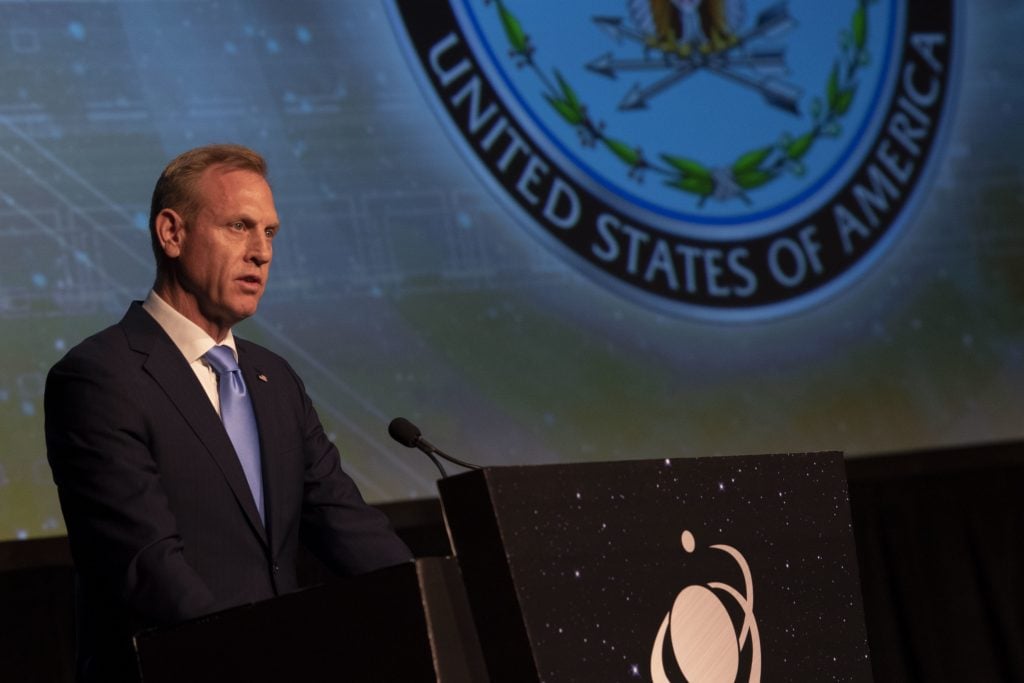Will Senate Ground Trump’s Space Force: ‘We Need Some Convincing’
Posted on

Acting Secretary of Defense Patrick Shanahan at the Space Symposium. (DoD photo)
CAPITOL HILL: In a high-stakes hearing, a bevy of top Trump Administration officials appeared before the Senate Armed Services Committee to make their case for establishing a Space Force.
Today’s results were perhaps not what the Pentagon was looking for.
“I guess we need some convincing that there is a necessity for a sixth branch without our armed forces,” Sen. Joni Ernst told the panel, echoing a sentiment Republican and Democratic lawmakers expressed in different ways during the three-hour hearing.
Ranking Democrat Jack Reed questioned why the National Reconnaissance Office, builder and operator of America’s spy satellites, would not be a part of the proposed Space Force, saying he was skeptical of creating a new “top-heavy bureaucracy” that would simply replicate things the Air Force is already doing.
The heavyweight panel of Acting Defense Secretary Patrick Shanahan, Chairman of the Joint Chiefs of Staff Gen. Joe Dunford, Air Force Secretary Heather Wilson, and U.S. Strategic Command head Gen. John Hyten did their best to assure lawmakers they were on top of these issues, but offered little new assuare Senate unease.
Shanahan explained to Reed that the NRO will remain outside the new office — for now — is simple: there’s no time.
“The bias in the proposal is towards speed,” he said, adding that talks are ongoing to establish a “point and time to do the integration” between the NRO and the Pentagon. But for now, “we thought about it as a multi-step process where eventually there would be more alignment, but not in the first phase,” Shanahan said.
(What was left unsaid is that the NRO has adamantly resisted being being drawn more closely into the orbit of the regular military. Then-Defense Secretary Ash Carter spent more than a year arguing with DNRO Betty Sapp that she had to work with the military in what is now the National Space Defense Center. The NRO prizes its independence which helps it move quickly and without what they usually consider obtrusive oversight from Congress and the press.)
The argument for moving fast was one that didn’t appear to carry much weight with senators, who all agreed that Chinese and Russian advances in space need to be met by the US, but that standing up an entire new branch of the military — with new staffs to match — wasn’t necessary, given other pressing needs.
Dan Sullivan of Alaska, asked, “is it prudent to take on what would be a fairly disruptive element of a new aspect of the services in the United States military when the current five services, lets face it, are not up to the readiness that they need to be?”
Dunford and Wilson said that readiness had improved across the Air Force and other services, adding that the new command structure wouldn’t pull funds away from readiness spending.
In his opening comments, SASC chairman James Inhofe also indicated he is far from sold on the idea. “When I first heard about the proposal, I asked two simple questions: What will the organization fix and how much will it cost?” he said. “This is going to be a $2 billion program, so for my purposes, I’m going to assume that’s right, but I’m still waiting for the answer for the other question,” he added.
Likewise, Joe Manchin told the Pentagon officials bluntly that standing up a new branch of the military “doesn’t make any sense to me. I’m sorry.” Speaking to Wilson, he added, “I’m having a real hard time understanding why we need this other agency. You’ve got everything at your disposal right now.”
“I’m skeptical,” Angus King said. “I understand the threat, and I understand our adversaries are moving forward, but I don’t understand how adding a box to an organizational chart is going to give us some kind of a qualitative military edge,” said Angus King, in Independent. “You’re doing a good job. Why are we going to ‘fix’ it?”
Colin contributed to this story.
Subscribe to our newsletter
Promotions, new products and sales. Directly to your inbox.
